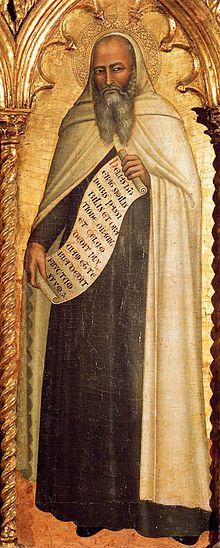
Back إيليا Arabic ܐܠܝܐ ܢܒܝܐ ARC ايليا ARZ Elíes AST İlyas Azerbaijani Илия Bashkir Ілья (прарок) Byelorussian Илия (пророк) Bulgarian এলিয় Bengali/Bangla ཨེ་ལི་ཡཱ། Tibetan
Elijah | |
|---|---|
 Prophet Elijah detailed in the Madonna and Child with Saints by Andrea di Bonaiuto | |
| |
| Born | possibly Tishbe |
| Died | c. 849 BC[1] near Jericho |
| Venerated in | |
| Feast | 20 July (Catholic Church,[3] Eastern Orthodox Church,[4] and the Lutheran Church–Missouri Synod[5]) |
| Patronage | |
Elijah (/ɪˈlaɪdʒə/ il-EYE-jə; Hebrew: אֵלִיָּהוּ, romanized: ʾĒlīyyāhū, meaning "My God is Yahweh[9]/YHWH";[10][11] Greek form: Elias[a] /eːˈlias/) was, according to the Books of Kings in the Hebrew Bible, a Jewish prophet and a miracle worker who lived in the northern kingdom of Israel[12] during the reign of King Ahab (9th century BC).
In 1 Kings 18, Elijah defended the worship of the Hebrew God over that of the Canaanite deity Baal. God also performed many miracles through Elijah, including resurrection, bringing fire down from the sky, and entering heaven alive "by fire."[13] He is also portrayed as leading a school of prophets known as "the sons of the prophets."[14] Following his ascension, Elisha, his disciple and most devoted assistant, took over his role as leader of this school. The Book of Malachi prophesies Elijah's return "before the coming of the great and terrible day of the LORD,"[15] making him a harbinger of the Messiah and of the eschaton in various faiths that revere the Hebrew Bible. References to Elijah appear in Sirach, the New Testament, the Mishnah and Talmud, the Quran, the Book of Mormon, and Baháʼí writings.
In Judaism, Elijah's name is invoked at the weekly Havdalah rite that marks the end of Shabbat, and Elijah is invoked in other Jewish customs, among them the Passover Seder and the brit milah (ritual circumcision). He appears in numerous stories and references in the Haggadah and rabbinic literature, including the Babylonian Talmud. According to some Jewish interpretations, Elijah will return during the End of Times.[16]
The Christian New Testament notes that some people thought that Jesus was, in some sense, Elijah,[17] but it also makes clear that John the Baptist is "the Elijah" who was promised to come in Malachi 3:1; 4:5.[18] According to accounts in all three of the Synoptic Gospels, Elijah appeared with Moses during the Transfiguration of Jesus.
Elijah in Islam appears in the Quran as a prophet and messenger of God, where his biblical narrative of preaching against the worshipers of Baal is recounted in a concise form.[19]
Due to his importance to Muslims, Catholics, and Orthodox Christians, Elijah has been venerated as the patron saint of Bosnia and Herzegovina since 1752.
- ^ Cline, Austin. "Biography of Elijah, Old Testament Prophet". Retrieved 17 July 2020.
- ^ Swayd, Samy (2015). Historical Dictionary of the Druzes. Rowman & Littlefield. p. 77. ISBN 9781442246171.
since Elijah was central to Druzism, one may safely argue that the settlement of Druzes on Mount Carmel had partly to do with Elijahʼs story and devotion. Druzes, like some Christians, believe that Elijah came back as John the Baptist
- ^ a b "St. Elijah the Prophet". 21 November 2014. Archived from the original on 3 June 2021. Retrieved 17 July 2020.
- ^ "The Glorious Prophet Elias (Elijah)". Retrieved 17 July 2020.
- ^ Calendar of Saints (Lutheran)
- ^ "Prophet Elijah".
- ^ Fukasawa, Katsumi (2017). Religious Interactions in Europe and the Mediterranean World: Coexistence and Dialogue from the 12th to the 20th Centuries. Taylor & Francis. p. 310. ISBN 9781351722179.
- ^ a b Mansour, Atallah (2008). Waiting for the Dawn: An Autobiography. The University of Michigan Press. p. 14. ISBN 9780436272585.
Perhaps this is because the patron saint of Haifa and Mount Carmel is a biblical figure recognised by the entire population of Palestine - Elijah.
- ^ Coogan, Michael David (2006). The Old Testament: A Historical and Literary Introduction to the Hebrew Scriptures. Oxford, England: Oxford University Press. p. 304. ISBN 9780195139105.
- ^ Sperling, S. David (2007). "Elijah". In Skolnik, Fred (ed.). Encyclopaedia Judaica. Vol. 6 (2 ed.). Thomson Gale. p. 331. ISBN 978-0-02-865934-3.
- ^ Barton, John; Muddiman, John (2007). "Elijah". The Oxford Bible Commentary. Oxford, England: Oxford University Press. p. 246. ISBN 9780199277186.
- ^ Yonge, Charlotte Mary (1859). "The Kingdom of Samaria". The Chosen People (5th ed.).
- ^ 2 Kings 2:11
- ^ 2 Kings 2:3
- ^ Malachi 4:5
- ^ "Elijah Heralding the Redemption - Moshiach 101". Archived from the original on 1 September 2017.
- ^ Matthew 16:14 & Mark 8:28.
- ^ For John the Baptist as Elijah, see Luke 1:11–17 & Matthew 11:14;17:10–13.
- ^ Tottoli, Roberto (2002). "Elijah". In Jane Dammen McAuliffe (ed.). Encyclopaedia of the Qurʾān. Vol. Two. Boston: Brill. pp. 12–13.
Cite error: There are <ref group=lower-alpha> tags or {{efn}} templates on this page, but the references will not show without a {{reflist|group=lower-alpha}} template or {{notelist}} template (see the help page).
© MMXXIII Rich X Search. We shall prevail. All rights reserved. Rich X Search